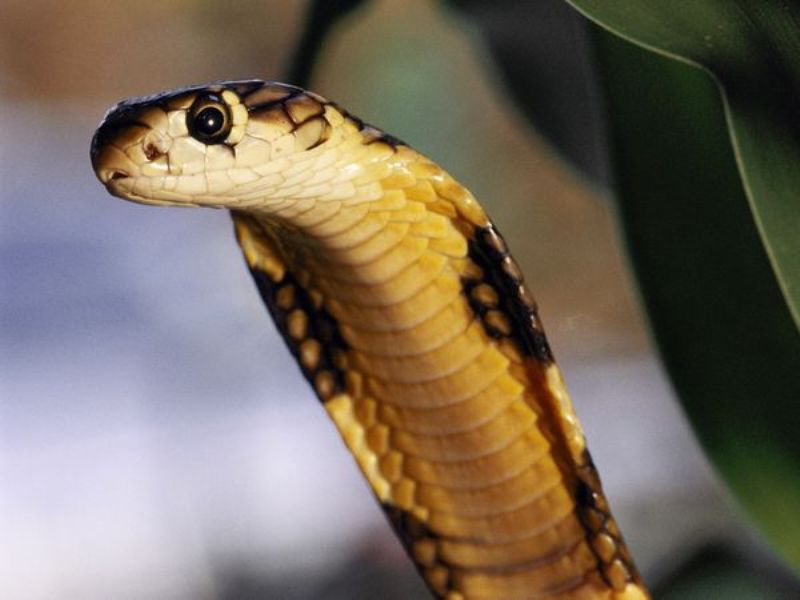Snakes
by Dave Hanks
I sit mesmerized. Five feet in front of me sways an Indian
Cobra. Back and forth it moves, hood extended, eyes fixed
on a point somewhere on my body. The eye spectacle
design on it's hood is eerie. Six foot of venomous reptile
has been grabbed and thrown upon the floor in front of me
and isn't too happy about it. I'm nervous but thankful that it can't quite reach me if it were to strike.
A long term fascination with snakes has brought me to this
seminar. In earlier times this fascination was coupled with
fear. A vivid memory is one of a circus that I had begged to attend when just a small boy. It was Sunday and my parents, after much badgering, had consented to take me. No sooner had we entered the fairground's gate than we came upon the first tent of the sideshow. A heavy woman was on the platform in front. A huge Python encircled her neck and shoulders. Sick feelings formed in my stomach and I pleaded to return home immediately - which we did, forgoing the circus that we had planned to see.
Garter Snakes were everywhere on our farm and I can still
picture them slithering from under foot as I walked along the ditch banks. One morning an unearthly squeaking was taking place in a patch of weeds by a ditch. Rushing to the noise, I was to witness a mother Meadow Vole with her teeth embedded in a large Garter Snake's head. The snake was trying to swallow her babies. The young ones were crying and she was making a terrible racket. The fascination of watching a snake eat has never ceased. When I feed the snakes in my Biology room, the students rush to the cages to watch.
My mind returns to the moment at hand. The Cobra is still
there in front of me, concentrating on that indefinable point. Jim Glenn, a noted herpetologist, is talking. He is telling about Cobras and he teases the one in front of me as he lectures. The snake strikes at his toe but misses as it is one inch too far away. "These snakes have tremendous concentration ability", he says, as he holds up an index
finger. The eyes are held on the finger, which allows Jim
to reach around with the other hand to scratch the back of
the hood. "This Indian species is famous because of snake charming but Cobras come in several other varieties
too. The 18-19 foot King Cobra of Southeast Asia is the
deadliest snake in the world. It can kill an elephant but is usually quite secretive. Ophegus hannah is a snake-eating snake. Africa has a half dozen species which include the "Spitter" and the Egyptian Cobra which bit Cleopatra. It was also the snake of Moses times - becoming a reptile again after a pinch behind the head had rendered it "rod-like". This most famous of snake families is the most intelligent but not the most dangerous. That distinction goes to the Black Mambas of Africa, the Kraits of Asia, and the Taipan of Australia.
The big constrictors are a most interesting group. Jim
passes several species of Boas through the room. Each
one immediately wraps around your arm when you receive
it. It requires an expenditure of strength to pry it off in order to hand it to the next person. The patterns on the
skins are most intricate and the colors shine with iridescence. There are three women in the class and they
are different from any I have ever known. They "baby talk"
each snake as they hold it and make kissing sounds with
their lips. Two large Reticulated Pythons are placed on
the floor. Both are over 20 feet long. Georgina is a pet
and dry to the touch. She is very gentle and enjoys being
stroked by everyone. Her body is a foot thick and it requires four of us to lift her. Ramrod is of a different
temperament however. He's so nervous that he urinates
well over a half gallon on the floor. Jim returns him to
the security of his box. It's amazing, each snake has it's
own distinct personality.
The most unusual group is the Vipers. Very short and
very thick - their bodies are the most colorful of all.
Heads that are shaped like arrow points make them most distinctive. These are highly venomous and we don't handle them. The Rhinoceros Viper is perhaps the most unusual with small skin protrusions that extend like Rhino horns.
Mr. Glenn is in a class by himself. He wears a white
laboratory jacket. Every pocket of the coat sports a
specimen - their heads extend and wreathe above each
pouch as he writes on the chalkboard. He's a man who
truly loves his work.
I will never love snakes like the women in this class butmy knowledge and tolerance of them has made a
significant gain. Fascinating, yes, but not fearful.
They are just another batch of creatures struggling
to survive in an ever shrinking world.
|
